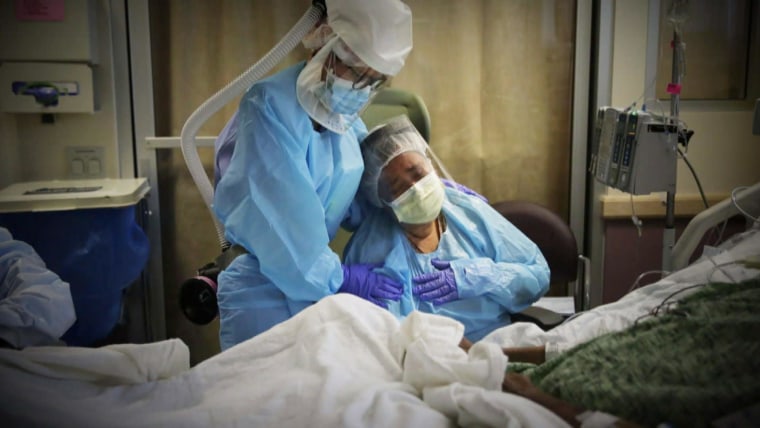Texas, Puerto Rico and the U.S. Virgin Islands stand alone in having recorded decreases in numbers of Covid-19 cases over the last two weeks as the country braces for a possible “third peak” of the disease.
Although Texas reported a “slight decrease” in cases over the 14-day period that ended Saturday, its news was better than elsewhere: 38 states, Washington, D.C., and Guam all recorded increases in cases over the last 14 days, and nine states have plateaued, according to NBC News tallies. Rhode Island, which, like Texas, has also had a net decrease, does not report data over the weekend, and Missouri is not reporting data because of a technology issue.
Cases numbers have spiked in Vermont and New Mexico as they battle spikes of about 117 percent in case numbers over the last two weeks.
“We are really struggling,” Dr. Todd Vento, director of the Telehealth Infectious Disease Program of Utah-based Intermountain Health, said on NBC’s “TODAY” show. “People are doing heroic work, but they are really getting to the point where it’s going to be literally unsustainable.”
On Saturday, thousands of people, many without masks, attended a Trump rally in Janesville, Wisconsin, as health officials urge residents not to gather with anyone outside of their immediate families. The state, which does not release case counts over the weekend, had a record 3,861 new cases Friday, according to the state’s health department.
In North Dakota, a whopping 4 percent of the state’s residents have contracted Covid-19 since March, most of the cases coming within the last few weeks.
North and South Dakota lead the U.S. in weekly virus cases per capita, according to an NBC News tally, and intensive care units are filling up across the states. According to the most recent data released by the North Dakota Health Department, there are 16 ICU open beds in the state, just one in the capital, Bismarck. The state, which does not have a mask mandate, only recommends that its residents cover their faces.
“You know, from my perspective, the mask mandate, it’s going to be hard to enforce,” said Kirby Kruger, director of the Health Department’s disease control division. “I think there’s a segment of the population that doesn’t want to do this. … It’s not something that they feel that the government should be forcing on them.”
Full coverage of the coronavirus outbreak
Gov. Doug Burgum has continued to stress individual responsibility as case numbers rise. “I think it’s important to the future of our state that we do understand there is something that is more powerful than an executive order — infinitely more powerful than a mandate — and these are the beliefs that individuals hold in their hearts,” he said at a news conference.
Burgum, a Republican, said he was “amazed” that people were still debating the mask mandate because “there is no other way to get someone to wear a mask other than for that person to choose to do that.”
Texas, where illness is declining slightly, has had more than 860,000 cases and almost 17,500 deaths. While the trends are somewhat positive, Gov. Greg Abbott deployed additional resources to the Panhandle and the South Plains on Friday to support hospitals.
“As the Amarillo and Lubbock communities see a rise in COVID-19 hospitalizations, the State of Texas is providing support to hospitals throughout these two regions,” Abbott, a Republican, said in a news release.
Epidemiologists warn of a possible “third peak” of Covid-19, this time largely centered in the Midwest and the Plains.
“Between Thanksgiving and New Year’s, we’re having what I see as potentially six weeks of super-spreader events, right, in which we’re going to be getting together with family and friends,” Dr. Carlos del Rio, an infectious diseases expert at the Emory University School of Medicine, said Friday. “And we can see a lot of disease happening.”

